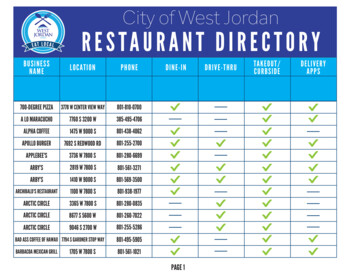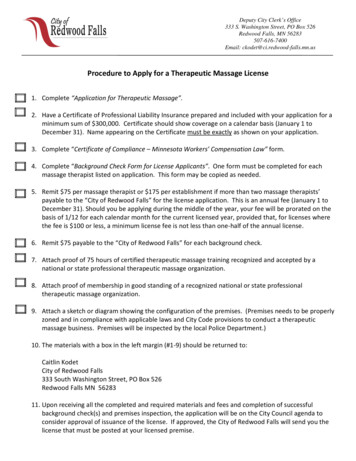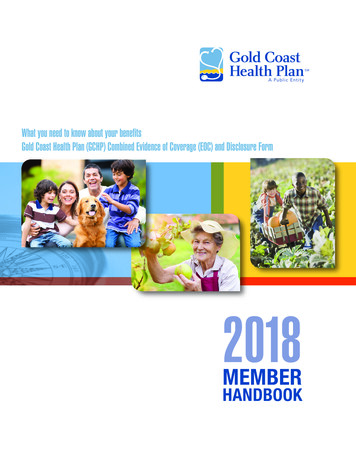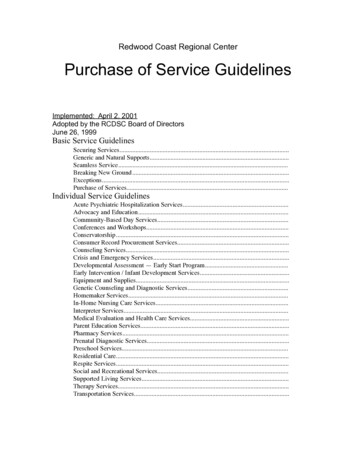
Transcription
Redwood Coast Regional CenterPurchase of Service GuidelinesImplemented: April 2, 2001Adopted by the RCDSC Board of DirectorsJune 26, 1999Basic Service GuidelinesSecuring Services.Generic and Natural Supports.Seamless Service.Breaking New Ground .Exceptions.Purchase of Services.Individual Service GuidelinesAcute Psychiatric Hospitalization Services.Advocacy and Education .Community-Based Day Services.Conferences and Workshops.Conservatorship .Consumer Record Procurement Services.Counseling Services.Crisis and Emergency Services.Developmental Assessment — Early Start Program.Early Intervention / Infant Development Services.Equipment and Supplies.Genetic Counseling and Diagnostic Services.Homemaker Services.In-Home Nursing Care Services.Interpreter Services.Medical Evaluation and Health Care Services.Parent Education Services.Pharmacy Services.Prenatal Diagnostic Services.Preschool Services.Residential Care.Respite Services.Social and Recreational Services.Supported Living Services.Therapy Services.Transportation Services.
Basic Service GuidelinesSecuring ServicesThe Lanterman Developmental Disabilities Services Act created regional centers such asRedwood Coast Regional Center to carry out many of the responsibilities of the State ofCalifornia regarding services to persons with developmental disabilities. This mandate places amajor emphasis on regional center service coordination activities and includes: Securing needed services and supports Advocacy for, and protection of, civil, legal, and service rights — including the right tochoice Identifying and building circles of support within the community Monitoring to assure quality services Expanding the availability of needed services Utilizing public and private community agencies and service providers to obtain services forclients In an emergency situation, securing direct treatment and therapeutic servicesGeneric and Natural Service SupportsThe regional center is mandated by Section 4659 of the Welfare and Institutions Code to secureand coordinate services in a cost effective manner. This requires the regional center to investigateand attempt to procure needed services and service funding from generic service providers andnatural supports. Generic Service Providers are governmental and public entities including butnot limited to Medi-Cal, Medicare, Civilian Health and Medical Program for Uniform Services(CHAMPUS), school districts, Supplemental Security Income (SSI), Social Security, Departmentof Mental Health, State Department of Rehabilitations, and California Children’s Service (CCS).Generic service providers also includes any existing private insurance.Natural Supports means assistance and support provided by family, friends, neighbors, fellowemployees, and other unpaid personal associations. Natural supports make a vital andirreplaceable contribution in a person’s life. However, in considering to what degree anindividual with developmental disabilities is to rely on natural supports (i.e., unpaid people), theplanning team must carefully consider the role of such natural supports in the life of a personwithout a developmental disability, as well as whether they can be depended upon to respond on asustained basis.The regional center is committed to pursuing generic and natural service supports in as timely afashion as possible, not allowing the securing of “denial of service” paperwork to stand in theway of providing a urgently needed service.Seamless ServiceThe regional center will act as the primary coordinating body for individuals with developmental
disabilities and will assist consumers and their families to obtain services through all othergeneric service providers as necessary, including coordination with other agencies, assistance infilling out appropriate paperwork, and advocacy and education on the consumer’s rights under thelaw.Breaking New GroundFrom time to time, consumers and their families may become aware of treatments and servicesnot covered by a specific service guideline. Among these are new, experimental, alternative,speculative and/or non-standard treatments. Such services may include medical treatments as wellas developmental, behavioral, and other therapeutic techniques. Therapies may vary in how wellthey are validated and accepted within the mainstream medical and professional community aswell as safety, cost, and documented effectiveness. Nonetheless, the regional center recognizesthat research and study is proceeding at a rapid pace, and we are committed to supportingconsumers and their families in pursuing the very best services necessary to achieve theirpotential.If a consumer brings a request for an experimental or novel service outside the scope of thesePurchase of Service Guidelines, the regional center will ask the consumer or the proposed serviceprovider to provide documentation to support the request. Most useful is positive, supportivestatements and data published in recognized peer reviewed journals, adopted by recognizedprofessional societies, or corroborated by objective experts in the relevant fields such as faculty atmajor universities or medical centers. Where appropriate, the regional center staff may assist inresearching the effectiveness of new services and collecting documentation.The planning team will study the information when considering the purchase of services relatedto experimental treatments to assess degree of risk, aversiveness, scientifically supported andanecdotal evidence of results, cost, demand on time and energy, informed consent, and its degreeof divergence from accepted treatments and accepted physiologic principles.When “proven” approaches are unavailable or shown not to work, the risk of using experimentaltreatment is very low, costs are limited, and anecdotal evidence is found promising by multiplerelevant professionals and families, the regional center may fund or assist the consumer insecuring non-traditional or experimental treatment. If nonstandard treatment is funded,continuation of funding will be based on objective evaluation of progress towards IPP/IFSP goals,which may include the need for record-keeping by consumer or family.If a particular treatment is frequently requested, the regional center will develop an IndividualService Guideline to clearly set forth parameters for consumers who may request such treatmentin the future.With the rapid pace of new medical treatments, research, and genetic testing, and the marketplace limitations that in reality often delay or prevent the testing of such treatments, we expectthat consumers and families will be faced with increasingly difficult and possibly agonizingdecisions in the area of therapy and treatment. Therefore, the regional center is committed to thecreation of an “ethics committee,” to assist consumers, families, and planning teams in addressingthe medical and social issues as they arise. In our vision, such a committee would consist ofcommunity professionals, legal, medical, social, and religious leaders whose gathered insightmight be solicited, on a voluntary basis, by planning teams or individuals as appropriate. Whilewe have yet to work out the details, we have set a target date of July 1, 2000 for the developmentand working guidelines of such a committee.Exceptions
Services available to consumers and families are not limited to these guidelines. These guidelinesreflect services that a service coordinator can routinely request. Sometimes there may besituations where services above and beyond these standards are required or may be required. Inapplying these standards, exceptions m;ay be considered based on the specific needs of theindividual and other relevant circumstances.Purchase of ServicesAccording to the Welfare and Institutions Code, in those instances when a consumer requiresservices related to his/her developmental disability and these services are not available naturallyor through generic sources, the regional center is required to base the purchase of such serviceson the following criteria: Services will provide good results for the amount of money spent, be efficient, and beeconomical. Decisions regarding “good results” and “cost effectiveness” will be made on an individualbasis, taking into consideration the consumer’s individual needs, goals, and preferences asexpressed by the consumer and any authorized representative of the consumer. Services will be provided as close to the consumer’s home as possible to reducetransportation costs and hardship. When more than one provider is available offering similar services of similar quality,preference will be given to the one with the most economical rate (however, see guideline#1, below). In the case of minor children, a family’s typical responsibility for providing similar servicesto a child without disabilities will be considered (however, see guideline #2, below).Additionally, in order to fulfill the regional center’s legal mandates to ensure good stewardship ofpublic funds, to respect an individual’s choices and preferences, and to support and respect thefamily (where applicable) in its role of service provider, the following purchase parameters willbe followed:1.In determining if two providers’ services are of similar enough quality to justify choosing theprovider of lesser cost, the planning team will give significant weight to the consumer’s (orconsumer’s authorized representative’s) choice and opinion as to which service providermost closely fits the consumer’s personal needs. The service coordinator will make everyattempt to ensure that consumer or authorized representative receives full, unbiasedinformation regarding service providers, and that choices and opinions may be expressed,free of pressure or censure.2.When considering a family’s responsibility for providing services to a minor child incomparison to its responsibility for providing similar services to a child without disabilities,families may request exceptions based on a family’s need or hardship. In such instances, theregional center will consider the request in view of how the individual’s developmentaldisability may affect the specific family’s circumstances and the regional center’sresponsibility to provide a family with the support necessary to maintain children withdevelopmental disabilities at home.3.In general, regional center funds may not be used for services that a legal settlement wasmeant to cover.4.Except in cases of emergency, services will not be purchased until the service coordinatorconfirms that all administrative steps and documentation have been completed.
5.No service purchased by the regional center will be continued unless the IPP/IFSP team,most particularly the consumer and family, agree that acceptable and beneficial progresstoward IPP/IFSP objectives has been made.6.Services purchased by the regional center must be from vendored or contracted serviceproviders. Vendorization or contracting is the process whereby the service provider appliesto the regional center to provide services, meets all service provider qualifications in Stateregulations, and is approved by the regional center.7.Where agreed to as appropriate to provide the quality and level of care in the most costeffective manner, “vouchers” (certain authorized alternative forms of service delivery whichenables the consumer or family member to purchase his/her own services and supports) maybe used to secure such services and supports as respite, in-home nursing, transportation,diapers, and adult day care services.8.In circumstances when agreement and coordination with another public agency to purchaseneeded services is stalled, the IPP/IFSP identifies the service as necessary to meet the needsof the consumer, and failure to do so would jeopardize the consumer’s health or safety, theregional center will purchase services as needed while continuing to seek resolution.9.Any and all applicable Individual Service Guidelines have been followed.Acute Psychiatric Hospitalization ServicesAcute psychiatric hospitalization means 24-hour inpatient care for consumers who are mentallydisordered or incompetent and includes such basic services as medical, nursing, rehabilitative,pharmacy, and dietary services. Such services may be provided in County Psychiatric HealthFacilities (PHFs) or private institutions and includes 23 hour a day partial hospitalization.Redwood Coast Regional Center (“regional center”) will secure acute psychiatric hospitalizationas needed for consumers. (See also: Crisis and Emergency Services guideline.)guidelinesIn addition to the Basic Service Guidelines, the following guidelines will be adhered to in thesecuring of acute psychiatric hospitalization:1.It is determined by the planning team that the need for hospitalization is related to thepresence of the developmental disability.3.The consumer or authorized representative agrees to admission.4.The regional center psychologist is informed of the need and his/her input is shared with theplanning team.5.Planning team will meet to prepare a plan for subsequent care needs and/or supports neededupon discharge.6.Medical factors that might contribute to behaviors or emotional state are addressed; wholeperson assessments and the use of positive behavior supports are to be utilized, wheneverpossible and applicable.7.Transportation to the psychiatric facility may be done by ambulance, mental health, sheriff’soffice, family, or vendored service provider, as appropriate.service standards & evaluation
The planning team, with input from the regional center psychologist, will authorize the servicecoordinator to secure acute psychiatric hospitalization for the consumer as needed andappropriate. If a crisis admission need arises, the on-call duty person or the service coordinatorwill consult with a supervisor before making the purchase (see also: Crisis and EmergencyServices guideline).
Advocacy ServicesAdvocacy services are those services designed to promote, protect, and defend the rightsof persons who have developmental disabilities. Such services include investigative,administrative, legal, and other appropriate remedies or approaches to ensure theprotection of rights.Redwood Coast Regional Center (“regional center”) is committed to providing consumers withadvocacy assistance in order to support them in obtaining their right to choice in how they livetheir lives.guidelinesIn addition to the Basic Service Guidelines, the following guidelines will be adhered to in theprovision of advocacy services:1.Consumers and authorized representatives may contact any Clients’ Rights Advocate (CRA)employed by regional center for advocacy assistance and/or the CRA employed byProtection and Advocacy, Inc. (PAI).2.Service coordinators will attend IEPs when invited and provide advocacy assistance toconsumers in obtaining services through the schools.3.Service coordinators will actively assist consumers in obtaining services due them fromgeneric sources.4,The regional center will attempt to expand opportunities for the full and equal participationof persons with developmental disabilities in their local communities through suchcommunity-based action as: outreach to, and training and education of, representatives of community service agenciesand programs, businesses, and community activity providers regarding the provision andexpansion of opportunities for participation by consumers; development and maintenance of a community resources list; assistance to service coordinators and family members on expanding communityinclusion options for consumers in the areas of work, recreation, social, communityservice, education, and public service; developing and facilitating the use of innovative methods by community members toprovide support in natural environments to regional center consumers; providing technical assistance to, and coordinating with, community support facilitatorswho will be used to provide supports to individual consumers for communityparticipation, as needed.5.The regional center will provide information, training and support for self-advocacy byconsumers.6.The regional center will offer and provide technical assistance to prospective and existinglocal consumer advocacy organizations.service standards & evaluationThe regional center will solicit input from consumers, families, regional center Staff, Area Board,CRAs, consumer advocacy organizations, and community service agencies to assess the quality
of the advocacy services being provided. That information will be made available to the regionalcenter Board of Directors and staff on an annual basis.
Community-Based Day ServicesCommunity-based day services are services designed to provide non-residential, ongoing training,education, and the supports necessary to access these services for individuals with developmentaldisabilities. These services are designed to promote independence, integration into thecommunity, productivity, and self-esteem. Programs could include but are not limited to activitycenters, adult development centers, behavior management day services, and child day careservices and programs.A wide variety of individuals can benefit from community-based day services. Families maychoose to enroll their children in services which will encourage inclusive interactions with otherchildren. Some who participate may be young adults who are preparing to transition from school,or adults who are seeking training in work skills, self-help skills, effective communication, orsocial interaction skills.A variety of accompanying supports may be offered on an individual basis for persons withexceptional challenges, in order for them to participate in community-based day services. Suchaccompanying supports may include aids, attendant care, program support, or tutors. Theseaccompanying supports are intended to assist the individuals in learning methods ofcommunication, behavioral self control, or specific functional skills which will allow them torealize their personal dreams or goals related to community-based day services.Redwood Coast Regional Center (“regional center”) supports the use of community-based dayservices to provide consumers with training and supports toward independence, inclusion in thecommunity, and the ability to self-advocate. Further, the regional center will continue to identifyunmet consumer needs while developing the necessary services and supports where none exist.guidelinesIn addition to the Basic Service Guidelines, the following guidelines will be adhered to in thesecuring of community-based day services:1.The planning team will consider a consumer’s needs, goals, strengths, and preferences, aswell as location of the service, type of services offered, including reasonable and appropriatetransportation, staffing ratio, and availability of accompanying supports if needed by theindividual.2.The planning team will consider all services available, including new and/or innovativeservices that may be appropriate to fulfill the individual’s goals.3.The planning team will consider whether or not the individual needs accompanying supportsin order to utilize and benefit from the services. Accompanying supports will be purchasedseparately from the community-based day services, and will be reviewed at least quarterly todetermine whether they are effectively supporting the consumer, and whether or not theconsumer continues to require them.service standards & evaluationPrior to the IPP, the service coordinator will assist the planning team by collecting informationand input from all relevant professionals including teachers, transitional team staff, relevantschool records, day services providers, therapists, and clinicians, including the regional centerstaff clinicians, as appropriate.
The planning team, most importantly, the consumer (and family members for children and wheninvited by adult consumers) will determine the number of days per week the consumer willparticipate in day services, generally not to exceed 5 days a week.Adult day service providers will supply written evaluations of how their program is achievingprogress on service objectives no less than twice a year. When accompanying supports areutilized, quarterly reviews on how such services have been utilized will be included in the twiceyearly reports.The planning team — most particularly, the consumer — in conjunction with service providerstaff, will determine if the program is making acceptable and beneficial progress on serviceobjectives on an annual basis.Conferences and WorkshopsConferences and workshops are formal announced meetings whose purpose is to discuss, educate,and provide an exchange of views regarding a topic or topics.Redwood Coast Regional Center (“regional center”) recognizes that persons with developmentaldisabilities and their parents or authorized representatives have occasional need to receivespecialized information or training about developmental disabilities. Regional center strives toprovide specialized information and training through clinicians, resource developers, specialtyclinics, and regional center hosted workshops. Conferences and workshops are an importantresource in providing specialized information, support, and/or training to meet identified needswhen local resources are not available.guidelinesIn addition to the Basic Service Guidelines, the following guidelines will be adhered to in thepurchase of conference and workshop attendance:1.Conference presenters and trainers must have demonstrated knowledge and expertise on thesubject matter to which they speak.2.The request for conference/ workshop attendance is related to a specific objective in theconsumer’s IPP/IFSP and addresses specific needs or desires of the consumer and/or family.3.The desired outcome of the conference/workshop is clearly stated by the planning team.4.Conference/workshop attendee understands that he/she may be asked to share conferenceinformation with others upon request.5.Regional center will regularly assess those areas of greatest need and desire for educationand will coordinate and/or attempt to attract local conferences and workshops to the areas itserves.service standards & evaluationCosts to attend conference and workshops may be paid for registration fees, meals, lodging, andtransportation, generally not to exceed 500 per conference/workshop. Typically, financialassistance to attend a conference or workshop would occur no more than annually.
ConservatorshipThe establishment of a conservatorship is a legal proceeding in which the court appoints anindividual or agency to be responsible for ensuring that a person is properly cared for and, whereappropriate, that he/she receive assistance in conservation of assets.Redwood Coast Regional Center (“regional center”) believes that the existence of adevelopmental disability should not in and of itself be sufficient reason for the establishment of aconservatorship. The primary purpose of regional center as an agency is to protect the rights ofconsumers to live and develop in the least restrictive environment. However, in certain situationsas set forth below, the regional center may assist families and other concerned individuals insecuring legal services to establish a conservatorship.guidelinesIn addition to the Basic Service Guidelines, the following guidelines will be adhered to in thesecuring of a conservatorship:1.Before a conservatorship is established, the planning team will carefully consider lessrestrictive alternatives including: training in self-advocacy and self direction, independentliving skills training services, an informal “helper,” power of attorney, direct deposit for SSI/SSA and or SSI Payee, emergency medical treatment, and court authorization of medicaltreatment for adult without conservator (Probate Code Section 3200 et. seq.)2.In those instances where there is a documented difficulty in obtaining or receiving servicesfor an adult with a developmental disability, and it appears that failure to establish aconservatorship will present a serious risk to the health, well-being, or property of aconsumer, the regional center may support the establishment of a limited conservatorship,granting only those necessary and specific powers needed for the well-being of theconservatee while encouraging the development of the individual’s maximum self-relianceand independence.3.Should parents, relatives, or other concerned persons initiate a referral for establishment of aconservatorship, the regional center will provide referral and information on low-cost legalassistance in accordance with the Lanterman Developmental Disabilities Services Act.4.Regional center will assist consumers who wish to contest conservatorship proceedings orthe terms of existing conservatorships by referring those consumers to Clients’ RightsAdvocates or other advocacy services including Public Defenders Office, Area Board,Protection & Advocacy, Inc., etc.service standards & evaluationBefore recommending conservatorship, the planning team will gather input from the regionalcenter executive director (or appointee), staff psychologist, staff physician, and consumer’s rightsadvocate.
Consumer Record Procurement ServicesProcurement of records includes obtaining copies of medical, psychological, educational,developmental, social, and other information, with authorization from a consumer, parent orguardian.Redwood Coast Regional Center (“regional center”) has an important role in procuring relevantrecords and reports and maintaining them for the purpose of determining the presence of adevelopmental disability or high risk infant condition and to assist the planning team in ongoingplanning.guidelinesIn addition to the Basic Service Guidelines, the following guidelines will be adhered to in thesecuring of consumer records:1.Service Coordinator will have written authorization from consumer or authorizedrepresentative.2.Authorizations will be time limited and specific regarding the information to be gathered.3.All records will be kept confidential.service standards & evaluationIn order to assist the interdisciplinary assessment team in determining eligibility, the regionalcenter intake coordinator is authorized to pay a customary fee, typically not exceeding 25 perrequest, in order to pay for the reproduction and mailing of consumer records.For the purpose of ongoing planning, the planning team may direct the service coordinator to paya customary fee for reproduction and mailing of consumer records, generally not to exceed 25per request.Counseling and Behavioral ServicesCounseling is a process whereby a practitioner using principles of psychotherapy, family therapy,applied behavioral analysis, and/or other professionally recognized techniques attempts to relieveemotional difficulties in living, increase adaptive behaviors, and/or prevent, reduce, or eliminatemaladaptive behaviors. Practitioners include such licensed professionals as: psychologist;psychiatrist; marriage, family, and child counselor (MFCC); developmental pediatrician; orlicensed clinical socia
pharmacy, and dietary services. Such services may be provided in County Psychiatric Health Facilities (PHFs) or private institutions and includes 23 hour a day partial hospitalization. Redwood Coast Regional Center ("regional center") will secure acute psychiatric hospitalization as needed for consumers.
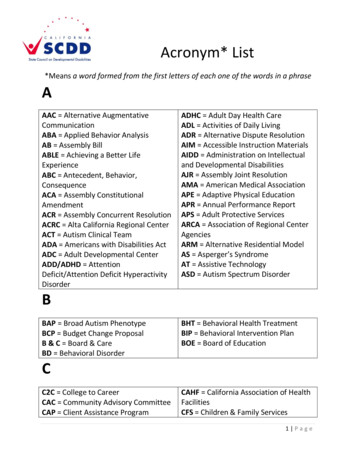



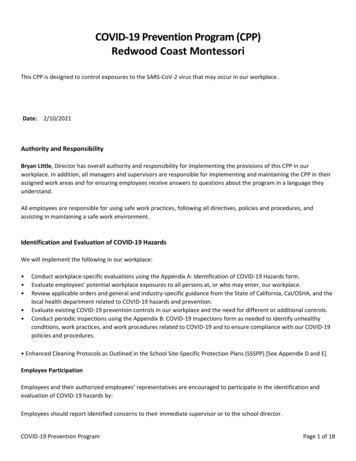

![[1] - nonoise](/img/32/redwood-20city-20california.jpg)
